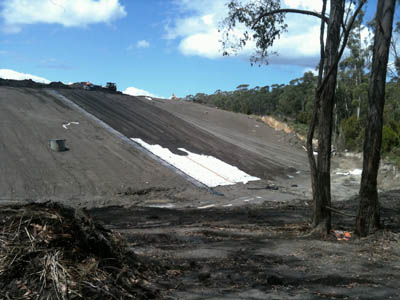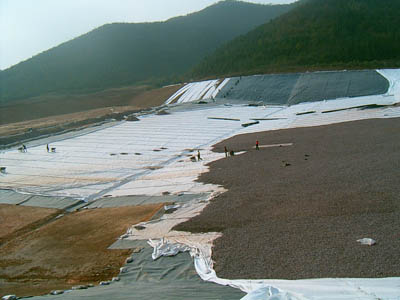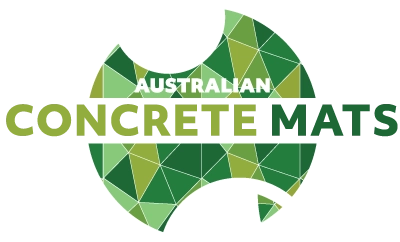Geosynthetic Clay Liners (GCLs) made from sodium bentonite clay have been used in landfill applications throughout the world for over 50 years. GCL is a highly effective waste containment barrier that reduces leakage from waste containment structures and water infiltration through landfill caps.
GCL Landfill Liner Applications
Infraclay natural sodium bentonite clay liners are generally installed as the bottom layer of a landfill lining system. It replaces compacted clay material which may not be available or present in the constructed landfill. The GCL acts as a primary seal to achieve ultimate protection for the HDPE liner which sits on top of it.
Because bentonite clay liners for waste containment cells are manufactured under quality controlled conditions, they perform better, are more economical and more durable than traditional clay. Unlike other geomembranes, bentonite clay self-heals around holes, punctures or protrusions, such as gas pipes, to reduce leaking caused by installation damage.
Geosynthetic Clay Liners are made from high-swelling natural sodium bentonite clay granules and a non woven geotextile, needle punched to a woven geotextile. When hydrated, sodium bentonite clay swells to form a waterproof barrier that other liquids cannot pass through. GCLs made from bentonite clay dust experiences excessive swelling and shrinking and have a higher permeability than granular bentonite at suctions less than 1000 kPa. For this reason, Geosynthetic Clay Liners made from granular bentonite should be used for landfill containment systems.
GCL Landfill Caps
When full, landfill cells are covered to eliminate odour and to prevent rainfall causing leachate to enter the groundwater. Bentonite clay liners provide the flexibility needed to accommodate the movement in waste material as it decomposes. Infraclay clay landfill liners are suitable for flat, sloped, or curved soil sites and landfill caps. Usually a layer of soil is placed over the liner and grass established to control soil erosion.
Geosynthetics Australia can also save you time and money by manufacturing geosynthetic clay liners to project specific requirements. Infraclay clay liners with a PE membrane bonded to them and GCLs made from saline resistant polymer modified bentonite are also available.

Infraclay GCL landfill cap at Barretta Landfill

Installing 130,000m2 of Infraclay clay liner (GCL) to seal the base of a landfill
Infraclay Landfill Cap
Specification
| Infraclay Landfill Liner | Unit | Value | ||
|---|---|---|---|---|
| GEOTEXTILE PROTECTION LAYER | PP non-woven white | g/m2 | 270 | AS 3706.1 |
| GEOTEXTILE CARRIER LAYER | PP slit film woven | g/m2 | 110 | |
| PP non-woven white | g/m2 | 270 | ||
| Composite | g/m2 | 380 | ||
| BENTONITE LAYER | Natural Sodium Bentonite @15% moisture content) | g/m2 | 4000 | |
| Fluid Loss | ml | ≤15 | ASTM D5891 | |
| Swell Index (2g/100ml/24h) | ml/2g | ≥27 | ASTM D5890 | |
| MASS PER UNIT AREA | GCL | g/m2 | 4650 | |
| BONDING PROCESS | Full needle-punched | |||
| EDGE ENHANCEMENT | 300mm bentonite clay | |||
| GRAB STRENGTH | MACHINE DIRECTION | N | 1000 | ASTM D4632 |
| CROSS DIRECTION | N | 1200 | ||
| PEEL STRENGTH | N/m | 240 | ASTM D6496 | |
| CBR BURST | STRENGTH | N | ≥2500 | AS 3706.4 |
| ELONGATION | % | ≥40 | ||
| HYDRAULIC CONDUCTIVITY | m/s | ≤3×10-11 | ASTM D5887 | |
| HYDRATED INTERNAL SHEAR STRENGTH (Peak value measured @ 30kPa normal stress) |
kPa | ≥45 | ASTM D6243 | |
| ROLL SIZE | Length(m) | 30 | ||












